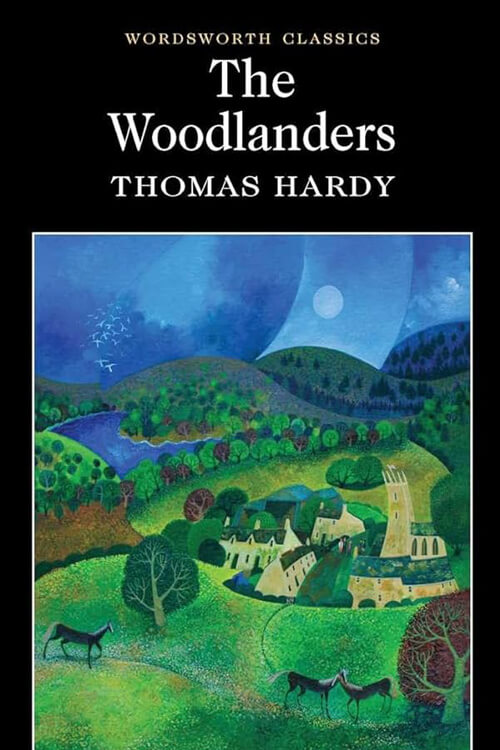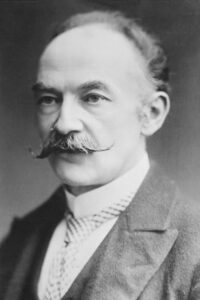
The Woodlanders
The rambler who, for old association or other reasons, should trace the forsaken coach road running almost in a meridional line from Bristol to the south shore of England, would find himself during the latter half of his journey in the vicinity of some extensive woodlands, interspersed with apple-orchards. Here the trees, timber or fruit-bearing, as the case may be, make the wayside hedges ragged by their drip and shade, stretching over the road with easeful horizontality, as if they found the unsubstantial air an adequate support for their limbs. At one place, where a hill is crossed, the largest of the woods shows itself bisected by the highway, as the head of thick hair is bisected by the white line of its parting. The spot is lonely.
The physiognomy of a deserted highway expresses solitude to a degree that is not reached by mere dales or downs and bespeaks a tomb-like stillness more emphatic than that of glades and pools. The contrast between what is with what might be probably accounts for this. To step, for instance, at the place under notice, from the hedge of the plantation into the adjoining pale thoroughfare, and pause amid its emptiness for a moment, was to exchange by the act of a single stride the simple absence of human companionship for an incubus of the forlorn.
At this spot, on the lowering evening of a bygone winter’s day, there stood a man who had entered upon the scene much in the aforesaid manner. Alighting into the road from a stile hard by, he, though by no means a “chosen vessel” for impressions, was temporarily influenced by some such feeling of being suddenly more alone than before he had emerged upon the highway.
It could be seen by a glance at his rather finical style of dress that he did not belong to the country proper; and from his air, after a while, that though there might be a somber beauty in the scenery, music in the breeze, and a wan procession of coaching ghosts in the sentiment of this old turnpike-road, he was mainly puzzled about the way. The dead men’s work that had been expended in climbing that hill, the blistered soles that had trodden it, and the tears that had wetted it, were not his concern; for fate had given him no time for any but practical things.
He looked north and south and mechanically prodded the ground with his walking stick. A closer glance at his face corroborated the testimony of his clothes. It was complacent, yet there was small apparent ground for such complacency. Nothing irradiated it; to the eye of the magician in character, if not to the ordinary observer, the expression enthroned there was absolute submission to and belief in a little assortment of forms and habitudes.
Read or download Book
Thomas Hardy
Thomas Hardy OM (2 June 1840 – 11 January 1928) was an English novelist and poet. A Victorian realist in the tradition of George Eliot, he was influenced both in his novels and in his poetry by Romanticism, including the poetry of William Wordsworth.
Biography.
He was highly critical of much in Victorian society, especially the declining status of rural people in Britain, such as those from his native South West England.
While Hardy wrote poetry throughout his life and regarded himself primarily as a poet, his first collection was not published until 1898. Initially, he gained fame as the author of novels such as Far from the Madding Crowd (1874), The Mayor of Casterbridge (1886), Tess of the d’Urbervilles (1891) and Jude the Obscure (1895). During his lifetime, Hardy’s poetry was acclaimed by younger poets (particularly the Georgians) who viewed him as a mentor. After his death, his poems were lauded by Ezra Pound, W. H. Auden, and Philip Larkin. Many of his novels concern tragic characters struggling against their passions and social circumstances, and they are often set in the semi-fictional region of Wessex; initially based on the medieval Anglo-Saxon kingdom, Hardy’s Wessex eventually came to include the counties of Dorset, Wiltshire, Somerset, Devon, Hampshire and much of Berkshire, in south-west and south central England.
Two of his novels, Tess of the d’Urbervilles and Far from the Madding Crowd, were listed in the top 50 on the BBC’s survey The Big Read.






